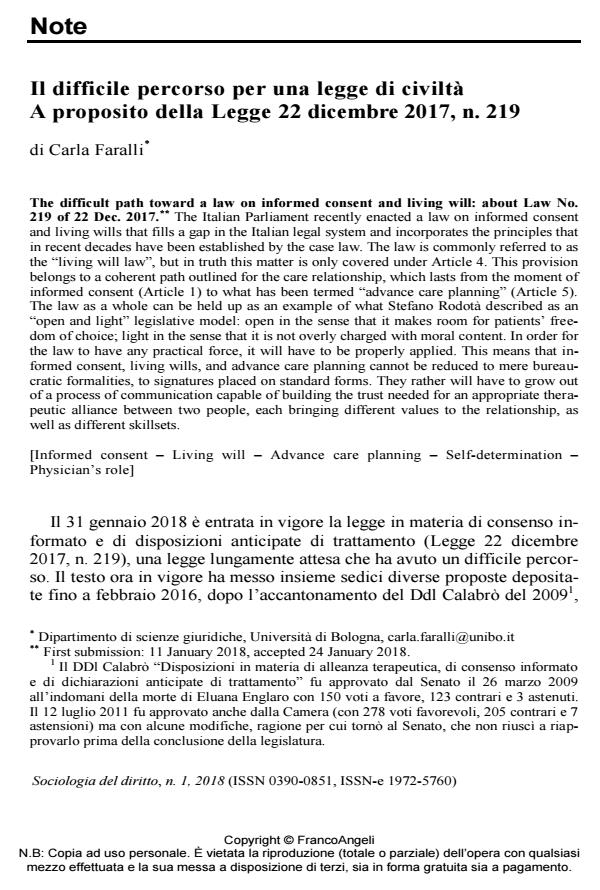The difficult path toward a law on informed consent and living will: about Law No. 219 of 22 Dec. 2017
Journal title SOCIOLOGIA DEL DIRITTO
Author/s Carla Faralli
Publishing Year 2018 Issue 2018/1
Language Italian Pages 9 P. 175-183 File size 213 KB
DOI 10.3280/SD2018-001008
DOI is like a bar code for intellectual property: to have more infomation
click here
Below, you can see the article first page
If you want to buy this article in PDF format, you can do it, following the instructions to buy download credits

FrancoAngeli is member of Publishers International Linking Association, Inc (PILA), a not-for-profit association which run the CrossRef service enabling links to and from online scholarly content.
The Italian Parliament recently enacted a law on informed consent and living wills that fills a gap in the Italian legal system and incorporates the principles that in recent decades have been established by the case law. The law is commonly referred to as the "living will law", but in truth this matter is only covered under Article 4. This provision belongs to a coherent path outlined for the care relationship, which lasts from the moment of informed consent (Article 1) to what has been termed "advance care planning" (Article 5). The law as a whole can be held up as an example of what Stefano Rodotà described as an "open and light" legislative model: open in the sense that it makes room for patients’ freedom of choice; light in the sense that it is not overly charged with moral content. In order for the law to have any practical force, it will have to be properly applied. This means that informed consent, living wills, and advance care planning cannot be reduced to mere bureaucratic formalities, to signatures placed on standard forms. They rather will have to grow out of a process of communication capable of building the trust needed for an appropriate therapeutic alliance between two people, each bringing different values to the relationship, as well as different skillsets.
Keywords: Informed consent, Living will, Advance care planning, Self-determination, Physician’s role
- Open Government Data: A Focus on Key Economic and Organizational Drivers Raimondo Iemma, in SSRN Electronic Journal /2012
DOI: 10.2139/ssrn.2262943 - Italian Ordinary Statute Regions and Derivatives Giulia Fantini, Chiara Oldani, in SSRN Electronic Journal /2015
DOI: 10.2139/ssrn.2689338
Carla Faralli, Il difficile percorso per una legge di civiltà A proposito della Legge 22 dicembre 2017, n. 219 in "SOCIOLOGIA DEL DIRITTO " 1/2018, pp 175-183, DOI: 10.3280/SD2018-001008